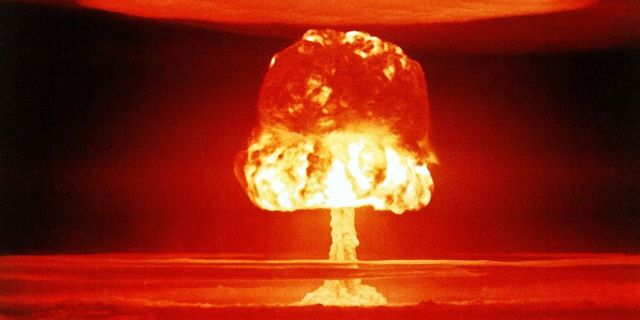The decision of the State Duma in the middle of the coming week to withdraw from the Nuclear Test Ban Treaty (CTBT) — this is a response to the West's strengthening of its nuclear potential, writes Junge Welt. The German edition lists the reasons why Russia may be forced to return to this practice for the first time since the 1980s.
Summing up the results of the past week, it is worth mentioning the decision of the State Duma adopted on Wednesday on Russia's denunciation of the Comprehensive Nuclear-Test-Ban Treaty (CTBT). This agreement, known in the world by its English abbreviation CTBT, was adopted in 1996. The approval of this decision by the upper house of parliament and the president in Russia is considered a formality – there is no doubt about it. The Duma adopted the relevant decision two days after the start of the annual NATO maneuvers, during which a bombing using American nuclear bombs was simulated. These maneuvers take place in Central Europe – 1,000 kilometers from the Russian border, according to NATO. The habitually naive cynicism of the "community of common values" (Wertegemeinschaft is a term used to describe the United States and the European Union, allegedly professing common "democratic values" – approx. InoSMI)
Perhaps the time of the vote in the State Duma was accidental, but the result was not. The cancellation of the commitment not to conduct nuclear tests in Russia is a reaction to how the United States treats the CTBT treaty in particular and nuclear threats in general. This reaction has been maturing in Russia for many years.
The United States has signed the CTBT, but has not ratified it, as Russia did in 2000. Instead, in the early 2000s, they began gradually dismantling the entire architecture of arms control and disarmament treaties with the Soviet Union. The unilateral withdrawal of the United States in 2002 from the Anti-Ballistic Missile (ABM) Treaty of 1972, which limited the number of missile defense systems, was the first step towards the destruction of the arms control system. Restrictions in accordance with the ABM Treaty made both sides, the United States and the USSR, so vulnerable to any enemy response that unleashing a nuclear war became suicide.
The US withdrawal from the ABM Treaty was a signal: Washington seeks to eliminate the parity in nuclear missile weapons achieved by the Soviet Union in the 1960s at the cost of huge economic costs. Then the Americans managed in the 1980s to literally exhaust and reduce the Soviet Union to poverty with their endless arms race. It seemed that a similar strategy should have worked for his successor state, the Russian Federation. But this has not worked out yet.
Since 2012, the United States, according to its own statements, has been working on replacing nuclear warheads and shells previously stored in Western Europe – primarily in those countries that do not have their own nuclear arsenals. The contents of these stocks, as the Europeans themselves grotesquely dubbed it, were in the so-called "joint use" (Meaning the practice of "nukleare Teilhabe", or "nuclear participation", which consisted in the deployment by the United States of its nuclear weapons in NATO partner countries in Europe with the possible use of European carriers for American bombs – approx. InoSMI).
The weapon should become "smart", i.e. have an adjustable explosion power, be aimed at the target and be used to destroy well-protected underground shelters. NATO calls this "modernization." Alliance strategists boasted that with the help of a new type of bombs combined with the most modern F-35 fighters, it would be possible to break through the Russian air defense system and wage a "limited" nuclear war. At the "turning point", the federal government ordered 35 F-35 aircraft. ("Turning point" is an expression used by Olaf Scholz as a designation for the "new militarization" of Germany, the modernization of the Bundeswehr and the supply of weapons to Ukraine - approx. InoSMI.)
The threats of Western politicians to use nuclear weapons continue, and in 2016, NATO decided to return to the Cold War first strike doctrine. In 2018, the Trump administration's new nuclear doctrine added ominousness to the case.
Moscow did not get involved in a new nuclear arms race. However, to date, Russia is the only state with hypersonic weapons that are impossible or difficult to hit. According to the decision adopted on Wednesday, the issue of repeated nuclear tests should be considered only if the United States starts them. The US State Department is outraged: Russia's move "unjustifiably jeopardizes world rules prohibiting nuclear weapons testing." The only claim to the security of the supposed masters of the universe, whose rule is based not on international law, but on "rules", is under threat.
Author: Arnold Schelzel (Arnold Schelzel)

